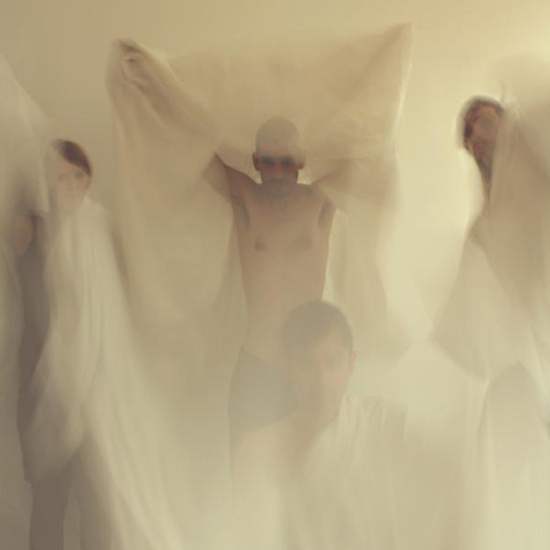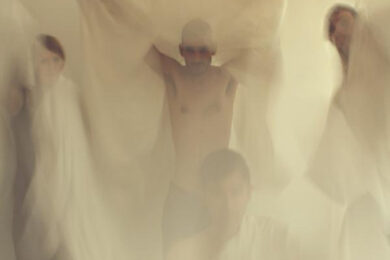Melbourne, Victoria has long been seen as the sole outpost of alternative musical culture in the Australian landmass. It was from there that the Birthday Party rose, and in recent years has spawned the likes of HTRK, My Disco, and fast rising group New War. Melbourne has long supported a vibrant cultural scene and supportive community – see the crowds who turned out for the funeral of Roland S Howard last year for evidence of that. But what of artists and musicians in places even further removed than Melbourne, such as Perth? A suburbanite’s dream and an ecologist’s nightmare, Perth is the capital of a land mass ten times the size of the United Kingdom, with a population of less than two million and a tiny art and music community that is almost as forgotten as the infilled swamps and sacred Aboriginal sites the city is built on. Constantly under threat by clueless governmental policy, local indifference and a fed up cultural core, it’s not uncommon for young creative practitioners to flee the oppressive gloom of one of the most beautiful coastlines in the world, and seek the freedom and fresh air of big city pollution and financial uncertainty instead.
Snowman – Absence by theQuietusThat’s why we now find Andy Citawarman and Joseph McKee of Snowman in an apartment in London’s Broadway Market, after leaving their hometown (dubbed ‘Dullsville’ by visitors and locals alike) and releasing their second album The Horse, The Rat and The Swan back in 2008. But despite their best efforts, Snowman are no more: recently, drummer and bassist (and husband and wife) Ross DiBlasio and Olga Hermanniusson called it quits and moved to Iceland, meaning that their third album Absence will also be their last. It’s a final farewell that they might never even perform live…
Being from Perth, it can feel so sterile – environmentally and culturally – yet it seemed to affect you and your music in such a profoundly violent way. Conversely, in finding yourself in the outwardly more difficult, cluttered conditions of London, you’ve come up with far more peace and clarity with Absence.
Joseph McKee: I think the environment that you’re in is only one aspect. You’re still stuck in your body, [and] your head. We’re stuck in our own brains and we’re still trying to communicate that. It doesn’t matter whether we’re in Madagascar or Australia or London. We’re still us making music and it’s still our spin on this environment. Whether you plonk me in Perth or here, I’ll still deal with that information in the same way. You can change and it affects you – and, of course, the music – in drastic ways that you don’t even imagine.
Andy Citawarman: Musically, I think it was just a natural response to what we’d been doing for the last two or three years with The Horse, The Rat and The Swan. Before we wrote that, after the debut album, we listened to stuff like The Boredoms and Swans and we changed all the time. We’d get bored quite easily, and when you start touring an album, you instantly disconnect yourself from it and the stuff that you listen to; you look for something new. So we started listening to more melodic music, which was the opposite to the influences of The Horse…. It was a difficult album to write and to tour, [and] our response to that was to write something that’s beautiful in a way.
JM: It’s cathartic, soothing, seductive, and actually sort of giving. At the end of the day, we’re not fucking nihilistic anarchists. We’re not tortured souls. If you channel that part of the brain then you will be, and that’s what happened with The Horse… – we did that. If you choose to channel negative emotions 24/7 and lock yourself in a room, then that is going to happen. It’s great for a piece of art and I think that everybody should do it because you come out a different person, but I don’t want to relive that same experience.
Absence was actually a lot more pleasurable to write and record. Not to say that it wasn’t hard work and that we didn’t put as much into it, because we did. We moved here and we set up house in a shit hole but we reacted differently, I think. We wanted to create something that was healing and I think that’s the difference. Although for a lot of people it might be a bleak-sounding record, for us it’s very healing.
Would it be those close quarters you encountered here, as opposed to the wide-open suburban surroundings that you have somewhere like Australia, that could have had an influence?
JM: One of the reasons the album was so much quieter was because we were living in a flat in London, and we were sharing walls with these Iranian people who didn’t like us making noise after certain hours. That was one of the reasons Ross had to play quieter in songs, and that also affected the way we made the record. Also, I just didn’t want to scream anymore. I had nothing to scream about.
AC: That’s one of the limits we put on ourselves. We didn’t want to do that.
JM: There were things we didn’t want to repeat and screaming was one of them. We didn’t want to be aggressive. We don’t want to hurt people. I don’t want to make abrasive music for the sake of it. Not that The Horse… was doing that but, just because people expected us to do it again, we weren’t going to do that.
You’ve mentioned that the postcards you’d been collecting while travelling through Europe had a strong influence on Absence. What was it about them that struck you?
JM: I collected these postcards not with any intention to make a record around them, but [because] essentially there was something about them that I wanted to achieve musically… that I wanted to create musically. They were soothing, and there was something that I just liked looking at. They gave me some kind of security, even though they’re quite cold. A lot of them are without people in them and there’s almost like a removal of something.
AC: An absence of something…
JM: That’s what this whole thing comes from. It’s about a dislocation of yourself from a place, the dislocation of the focal point from a picture, or the focal sound from a song. It was about the removal of these things and creating a kind of audio environment for what I would imagine these pictures would sound like. That was texturally and sound-wise what we were aiming to do. That’s where some of those ideas were born from, and by the time I got back to London we found a place in Walthamstow and we were all living together.
When I looked at these photos, all of them had this element that I couldn’t put my finger on. I couldn’t say, ‘That’s an angry one. That’s making me feel "romantic". That’s amorous.’ It had this absence of something, while not knowing quite what that was, and accepting it. We tried to communicate that same feeling musically.
AC: Lyrically, as well. It’s that repetition of wanting to remember. It’s an obsession, in a way.
JM: Yeah, a mantra. It was a healing process, with those photographs as a bit of a guideline; the experience of being dislocated from our loved ones and everything that we knew and trying to find a way of digesting all that information. Trying to find a way of connecting with people through these other means of communication. You have mobile phones and the internet but it felt like fucking smoke signals. It’s technology, not a real relationship.
There was this whole idea of communication abroad, through whatever means available. I translated it into a metaphor of communicating with the dead, and the impossibility of doing that properly. You might think you’re communicating with the dead, but really, it’s whatever you want it to be. There’s this whole loose concept for the record, based on a partnership between a man and a woman. The man passes away and, essentially, she’s trying to communicate with him and she believes that’s he’s trying to communicate with her. But there are obstacles.
That’s something I’ve always appreciated about music – the way it recognises and translates emotions that there aren’t words for. Being away from home, it’s not nostalgia and it’s not homesickness. It’s a kind of emptiness; a feeling you can’t express verbally but musically you can do that.
JM: Yes, very true. You’re kind of highlighting a feeling that can’t be said in words, necessarily. Music has the capacity to capture something that words and visual art sometimes can’t. Art is a representation of something else. Words are a way of describing or communicating something in a very straightforward way, but music is something unto itself. That’s why it’s the most important form of art.
Your album cover should have been an underscore, like the silences between words or the things that aren’t said in a film.
JM: What’s left unsaid… It’s all about those spaces, all those moments in between. That is definitely something that we were trying to capture. What there is in between the lines, without bludgeoning people so much with an idea.
I’ve always felt that sense of statelessness from you as a band, and your focus on your points of difference with Perth and Australia, rather than what you might have had in common with them. That’s why Absence is literally the apex of the triangle to me, because it’s your clearest reflection of being Snowman in relation to Perth. The first album [2006’s Snowman] was you getting pissed off at your situation, and The Horse… was you getting depressed. Absence is as if you’ve accepted it, and now you can move on.
JM: That makes sense. And in a nutshell way, you’re kind of right. The first one is juvenile angst, in a way…
Let’s not disregard it – it has its own merit…
JM: Thank you. The second one is definitely taking on more of that annoyance to a higher level and to a larger scale – a kind of apocalyptic scale. [Laughs] This one says, ‘Okay, I’m taking a step back and I’m taking a deep breath but I’m also diving in to the deep end and letting go a little bit.’
For me, it feels like the point at which everything before this record has been getting to that cliff face and this is like jumping into the ocean from that point. Or maybe The Horse… was the fall, and now I feel like I’m swimming.
Snowman’s final album Absence is out now



